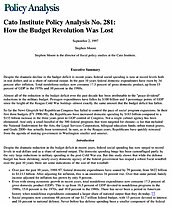Despite the dramatic decline in the budget deficit in recent years, federal social spending is now at record levels both in real dollars and as a share of national output. In the past 10 years federal domestic expenditures have risen by 34 percent after inflation. Total nondefense outlays now consume 17.5 percent of gross domestic product, up from 15 percent of GDP in the 1970s and 10 percent in the 1960s.
Almost all of the reduction in the budget deficit over the past decade has been attributable to the “peace dividend” reductions in the military budget. Pentagon expenditures have fallen by $100 billion and 3 percentage points of GDP since the height of the Reagan Cold War buildup–almost exactly the same amount that the budget deficit has fallen.
So far the Newt Gingrich-led Republican Congress has failed to control the pace of social program expansions. In their first three budgets (FY 1996–98), the Republicans have increased domestic spending by $183 billion compared to a $155 billion increase in the three years prior to GOP control of Congress. Not a single cabinet agency has been eliminated. And only a small handful of the 300 federal programs that were targeted for closure–a list that included the National Endowment for the Arts, the Legal Services Corporation, bilingual education funds, urban transit grants, and Goals 2000–has actually been terminated. In sum, as in the Reagan years, Republicans have quickly retreated from the agenda of making government in Washington smaller and smarter.

This work is licensed under a Creative Commons Attribution-NonCommercial-ShareAlike 4.0 International License.
